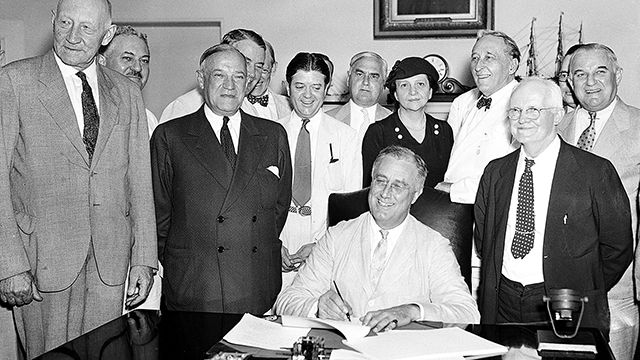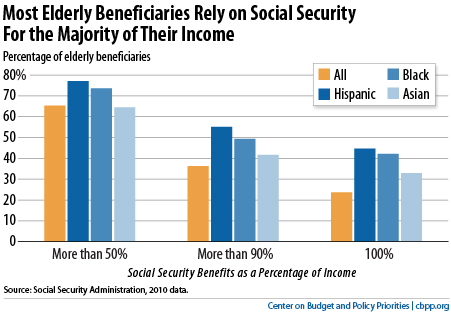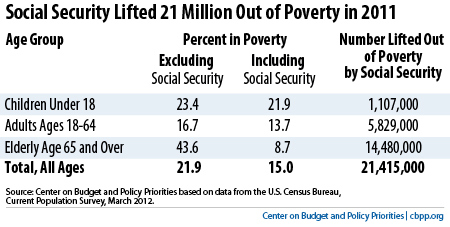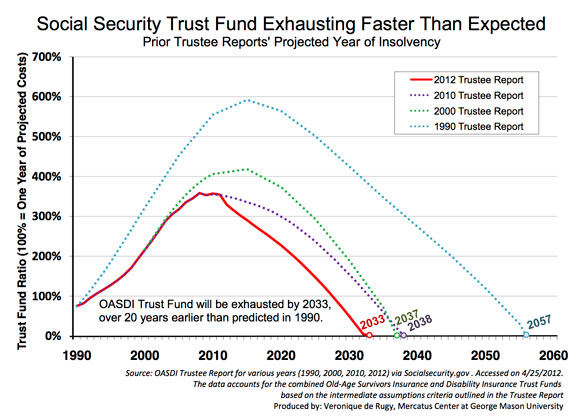
Seventy-eight years ago this week, President Franklin D. Roosevelt signed the 1935 Social Security Act into law. Today, the program benefits 57 million Americans, one-third of whom rely on it for at least 90 percent of their income. It also lifts 21 million Americans — more than half of the elderly population — out of poverty.
Here are some charts from the Center for Budget and Policy Priorities on the program’s formidable role in our country’s social safety net:

CBPP

CBPP
Though social security mainly benefits the elderly , it also helps lift many others out of poverty. It protects workers with a severe medical condition, and children whose breadwinner dies, retires or becomes disabled.
The program’s next few decades could see some problems. Because of a bipartisan agreement signed during the Reagan presidency (the likes of which would be nearly impossible today) the Social Security program is solvent through 2033 — but after that, it will only have enough funding to provide three-quarters of promised benefits. And as 2033 looms nearer, baby boomers are getting older, with 10,000 reaching retirement age every day; pension programs are becoming increasingly rare and, in the wake of the Great Recession, many families’ retirement resources are depleted.
In recent years, as budget and federal funding standoffs have grown more and more common, moderate politicians have looked for ways to cut entitlement spending and mollify angry voices on the right — and Social Security has caught their eye. Many progressives and policy wonks were unsettled by recent steps in this direction — particularly Obama’s plan in his 2014 budget to change the cost-of-living indicators used to calculate Social Security (from CPI to chained CPI), effectively decreasing the amount of funds paid out by the program. Days before the Obama budget proposal was released last April, the New America Foundation laid out a much blogged about plan calling for politicians to do the opposite — to “substantially expand the successful, purely public Social Security program” — arguing, “in reforming America’s retirement security system, we should build upon what works.” The report’s authors write:
The conventional wisdom about Social Security is profoundly misguided. According to today’s mistaken consensus, the U.S. as a society cannot afford to allocate the money to pay for the present level of Social Security benefits for retirees in future generations. The solution, it is widely argued, is to cut benefits […] This consensus is not only misconceived in its diagnosis but also mistaken in its prescriptions and potentially disastrous in its consequences.
Kathy Ruffing, a senior fellow at the Center for Budget and Policy Priorities, writes that, short of overhauling the Social Security system, politicians can take steps to insure that the program will fully meet its promises in coming decades. She argues:
Social Security faces a long-term shortfall that’s predictable and manageable. Those who fear that Social Security won’t be around when today’s young workers retire misunderstand the [program’s] trustees’ projections. …Of course, policymakers should act well before then to place this popular program on sound long-term footing. The best proposals would protect vulnerable workers and beneficiaries and give all participants ample notice of future changes to this vital program.
Ruffing suggests tweaks in the payroll tax to make sure the shortfall is covered. And even though the program’s trustees predict that the percentage of Americans over retirement age will continue to grow as life expectancy increases, they also project that Americans will be more prosperous in decades to come, and more able to help fund the program.


